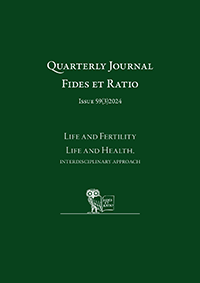Abstract
The presented study aimed to adapt the Resiliency Scales – A Profile of Personal Strengths in a group of 357 students (178 adolescents with mild intellectual disability and 179 students within intellectual norm) and to conduct a preliminary analysis of its psychometric properties. In accordance with the theoretical background of the completed analyses – resilience theory – the respondents taking part in the study have experienced various challenges during their life. The Resiliency Scales – A Profile of Personal Strengths intends to measure such personality traits of an individual that enable them to better overcome difficulties and adversity (Prince-Embury, 2006). The first stage of the psychometric verification was to study descriptive statistics and distribution. The next stage was reliability analysis and confirmation procedure for factor analysis. The last phase of the adaptation was to standardize the results and prepare norms. As a result of the performed analyses, it can be concluded that Resiliency Scales – A Profile of Personal Strengths is characterized by satisfactory psychometric properties.
References
Borucka, A., Ostaszewski, K. (2008). Koncepcja resilience. Kluczowe pojęcia i wybrane zagadnienia. Medycyna Wieku Rozwojowego, 12, 587-597.
Clark, M., Adams, D. (2021). Resilience in Autism and Intellectual Disability: a Systematic Review. Review Journal of Autism and Developmental Disorders, 9, 39–53. https://doi.org/10.1007/s40489-021-00239-w
Gilmore, L., Campbell, M., Shochet, I., Garland, R., Smyth, T., Roberts, C., West, D. (2014). Promoting Resilience in Children with Intellectual Disability: A Randomized Controlled Trial in Australian Schools. (In:) S. Prince-Embury, D.H. Saklofske (eds.), Resilience Interventions for Youth in Diverse Populations, 353-373. New York: Springer.
Gilmore, L., Campbell, M., Shochet, I., Roberts, C. (2013). Resiliency profiles of children with intellectual disability and their typically developing peers. Psychology in the Schools, 50, 1032-1043. https://doi.org/10.1002/pits.21728
Hall, A., Theron, L. (2016a). Resilience processes supporting adolescents with intellectual disability: A multiple case study. Journal of Intellectual and Developmental Disability, 54(1), 45-62. https://doi.org/10.1352/1934-9556-54.1.45
Hall, A., Theron, L. (2016b). How school ecologies facilitate resilience among adolescents with intellectual disability: Guidelines for teachers. South African Journal of Education, 36(2), 1-13. https://doi.org/10.15700/saje.v36n2a1154
Halstead, E.J., Hastings, R.P., Griffith, G.M. (2018). Evidence for the Protective and Compensatory Functions of Resilience in Children with Intellectual and Developmental Disabilities. Advances in Neurodevelopmental Disorders, 2(2), 216-223. https://doi.org/10.1007/s41252-018-0065-5
Franczok-Kuczmowska, A. (2022). The meaning of resilience in adulthood. Kwartalnik Naukowy Fides et Ratio, 51(3), 133-140. https://doi.org/10.34766/fetr.v3i51.1089
Kwiatkowski, P. (2016). Resiliencja rodziny jako źródło pozytywnej adaptacji młodzieży. Wychowanie w Rodzinie, 12(1), 311-343.
Luthar, S.S., Cicchetti, D., Becker, B. (2000). The Construct of Resilience: A Critical Evaluation and Guidelines for Future Work. Child Development, 71(3), 543-562.
Matson, J.L., Terlonge, C., Minshawi, N.F. (2008). Children with intellectual disabilities. W: R.J. Morris, T.R. Kratochwill (ed.), The practice of child therapy, 337-361. Lawrence Erlbaum Associates Publishers.
Mudrecka, I. (2013). Wykorzystanie koncepcji resilience w profilaktyce niedostosowania społecznego i resocjalizacji. Resocjalizacja Polska, 5, 49-61.
O’Donnell, D.A., Schwab-Stone, M.E., Muyeed, A.Z. (2002). Multidimensional Resilience in Urban Children Exposed to Community Violence. Child Development, 73(4), 1265-1282.
Opora, R. (2016). Ewolucja niedostosowania społecznego jako rezultat zmian w zakresie odporności psychicznej i zniekształceń poznawczych. Wydawnictwo Uniwersytetu Gdańskiego.
Prince-Embury, S. (2006). Resiliency Scales for Adolescents. A profile of Personal Strengths. Hartcourt Assessment.
Ryś, M., & Trzęsowska-Greszta, E. (2018). Kształtowanie się i rozwój odporności psychicznej. Kwartalnik Naukowy Fides et Ratio, 34(2), 164-196.
Sikorska, I. (2016). Odporność psychiczna w okresie dzieciństwa. Wydawnictwo Uniwersytetu Jagiellońskiego.
Sikorska, I. (2017). Resilience in the light of positive psychology- adventure education and adventure therapy. Psychoterapia, 2(181), 75-86.
Talaga, M., Sikorska, I., Jawor, M. (2018). Odporność psychiczna u osób z zaburzeniami afektywnymi i lękowymi a doświadczenia wczesnej traumy- badania pilotażowe. Psychiatria Polska, 52(3), 471-486.
Urban, S. (2012). Agresja młodzieży i odrzucenie rówieśnicze. Wydawnictwo Naukowe PWN.
Werner, E.E. (1994). Overcoming the odds. Developmental and Behavioral Pediatrics, 15(2), 131-136.

